At first glance, lifting straps are fairly simple tools; they’re thin strips of cotton or nylon that connect your wrists to a barbell to help you hold on to heavier weight for longer periods of time. And while they may seem like a crutch, lifting straps can be extremely helpful for building strength, allowing you to push your larger muscles (like your quads or posterior chain) without being limited by your grip strength.
But there are many types of lifting straps on the market, so finding the right one for your needs can be a daunting task. Luckily, our team of experts (including personal trainers and fitness enthusiasts) tested a variety of products to find the absolute best lifting straps for your personal training style and fitness goals.
Our Picks for the Best Lifting Straps of 2026
- Best Overall Lifting Straps: Gymreapers Lifting Straps
- Most Durable Lifting Straps: Iron Bull Unleash Lifting Straps
- Best Lifting Straps for the Money: Gymreapers Lifting Straps
- Best Powerlifting Lifting Straps: Rogue Fitness Ohio Straps
- Best Lifting Straps for Deadlifting: Gymreapers Figure 8 Lifting Straps
- Best Lifting Straps for Bodybuilding: Iron Bull Classic Lifting Straps
- Best Weightlifting Lifting Straps: Gymreapers OIympic Lifting Straps
- Best Lifting Hook: Iron Bull Lifting Grips/Hook
- Most Secure Lifting Strap: Gymreapers Figure 8 Lifting Straps
How We Tested and Chose the Best Lifting Straps
With so many different kinds of lifting straps available, we had a lot of digging to do. We considered and tested out the design, durability, and price when deciding which straps were our favorites.
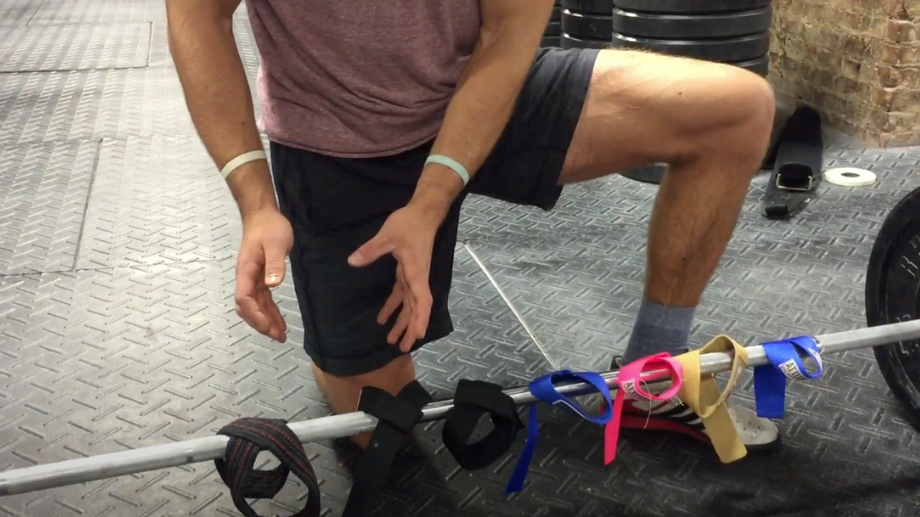
Lifting Strap Design
The three most common types of lifting strap are single-loop, which is commonly used for weightlifting; lasso, which is a jack-of-all-trades strap; and figure 8, which is commonly used in strongman and high-level powerlifting. Different athletes have different needs, so we tried out all the different kinds and found the best option in each category.
Materials and Durability
There are also different types of fabrics that make up lifting straps, including cotton, nylon, leather, and other poly-mix materials. The materials affect the durability of a lifting strap, so we made sure to try out heavy-duty products. Most lifting straps are made of cotton and nylon but you can also find leather and suede varieties. The most durable straps are made of reinforced polyester blends or cross-stitched cotton, and our testers definitely gave those a try.
Durability is another major factor we looked for while testing and choosing the best lifting straps. We want straps that can last repeated use and safely withstand plenty of weight. A heavy-duty lifting strap can hold over 1,000 pounds, and some straps, like figure 8 straps, have held over 1,200 pounds (like in the silver dollar deadlift world record). This is due to their design, reinforced stitching, and material layering.
Price
Price is also an important consideration since we want to ensure we’re highlighting products that offer good value. It may not be quite as large a consideration with lifting straps as it is with other products that can get quite pricey (such as lifting belts and shoes), but getting a good product for your hard-earned money is something that everyone wants. Lifting straps can range from under $10 bargain-bin straps to a pair of heavy-duty figure 8 straps that might run you upward of $50. We included some straps from both ends of the price range as well as those in between, so no matter your needs or budget, we’ve got you covered.
Best Overall Lifting Straps: Gymreapers Lifting Straps
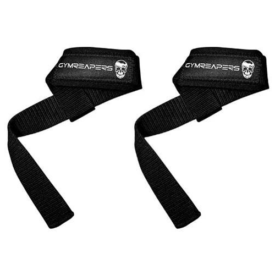
Gymreapers Lifting Straps provide the security and comfort that many lifters desire at an affordable price. These 18 inch straps are available in nine different colors. You can rely on these straps for shrugs, deadlifts, cleans, or heavy dumbbell rows.
Specs
- Style: Lasso
- Material: Cotton/Neoprene
- Length: 18 inches
- Padding: Yes
- Price: $16.99
- Color Options: Black, Black/Red, Desert Tan, Military Green, Navy, Pink, Gray, Red
Pros
- The 18-inch length can wrap around the bar enough to provide a solid amount of grip security, even on fat bars.
- The slim layer of neoprene padding around the wrist can help prevent skin pinching or abrasion during heavy lifts.
- Gymgoers who prefer to have a bit of color variety will like that these straps come in nine color options including black, green, and pink.
Cons
- The 18-inch length might be too short for lifters with big wrists or those who want a more secure grip.
- If you need more security for, say, long-distance farmer carries, you should look for something more secure, like a figure 8 strap.
- Weightlifters should look for something more quick-release (like a closed-loop strap), since they may have to bail quickly on lifts.
The best lifting straps need to provide a mixture of security, versatility, and durability. We love using them because they help give us the confidence to pull heavier weight without worrying about the barbell slipping out of our fingers — from personal experience, they’re great when working on a PR. “I’m convinced my grip will never catch up with how much I can actually lift,” writes one five-star reviewer. “And these give me the confidence to push for heavier weight. Very comfortable and easier to use.”
These lifting straps from Gymreapers offer a combination of security and comfort that lifters want without being too invasive. At 18 inches long, these straps can wrap around the bar a couple times to provide extra security, so you know your bar or dumbbell isn’t going anywhere once you’re strapped in. You can just grip it and rip it. Plus, we found that the thin neoprene padding provides just enough cushion to help prevent the straps from digging into skin or joints.
If you’re not a fan of padding, Gymreapers offers options that don’t include padding on the wrist. The Gymreapers Lifting Straps are made from a durable combination of neoprene and cotton, and they offer a lifetime replacement guarantee.
These lifting straps from Gymreapers are an excellent choice for both beginners and advanced lifters. They’re relatively inexpensive, don’t have a learning curve to use (like Olympic lifting straps or figure 8 straps), and offer a measure of comfort, thanks to the neoprene wrist padding (which is optional). The heavy-duty construction can also satisfy experienced lifters who don’t want to buy a new set every few months.
Most Durable Lifting Straps: Iron Bull Unleash Lifting Straps
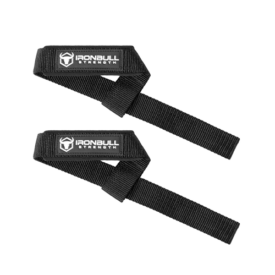
Iron Bull's lifting straps are durable and adjustable in order to fit just about any wrist size. They also have neoprene wrist paddings for extra comfort.
Specs
- Style: Lasso
- Material: Nylon/neoprene
- Length: 24 inches
- Padding: Yes
- Price: $22
- Color Options: Black, Grey, Red
Pros
- Durable nylon material and strategic stitching helps keep these straps alive for longer.
- These have a comfortable, five-millimeter neoprene pad.
- The 24-inch length provides extra grip security during heavy lifts.
Cons
- The extra-long strap may be too bulky or unnecessary for people with small hands.
- These aren’t the most expensive straps on the market, but there definitely are cheaper alternatives.
Many folks purchasing gym equipment want a product that will last them a long time, getting them a good return for their money spent. When selecting the most durable lifting straps, we took into consideration not only how the straps are made, but also the material they’re made from.
Heavy pulls like hang cleans and deadlifts can put a lot of stress on lifting straps, especially when you use a bar that has moderate to intense knurling. Rubbing the straps consistently against knurling can damage and weaken lifting straps, which is why we’re fans of the heavy-duty nylon material used in these straps from Iron Bull. Their 24-inch length — which is about six inches longer than the standard pair — also contributes to the durability of these straps. The extra length means you can loop the strap around the bar more (and therefore distribute the weight more) than you would with, say, an 18-inch strap. In our experience, we saw zero fraying of the straps, however, we don’t know how they would hold up with long-term use.
On the comfort side, these straps also feature five-millimeter neoprene padding around the wrist to help increase comfort and prevent pinching of the skin and bruising. Plus, the seam of the straps is at the top of the loop to prevent chafing, too.
Iron Bull set out to make the most durable pair of lifting straps on the market, and they did a solid job of it. The material is meant to last, and the longer length of these straps helps to distribute the weight being held on the straps.
Best Lifting Straps for the Money: Gymreapers Lifting Straps

Gymreapers Lifting Straps provide the security and comfort that many lifters desire at an affordable price. These 18 inch straps are available in nine different colors. You can rely on these straps for shrugs, deadlifts, cleans, or heavy dumbbell rows.
Specs
- Style: Lasso
- Material: Cotton/Neoprene
- Length: 18 inches
- Padding: Yes
- Price: $16.99
- Color Options: Black, Black/Red, Desert Tan, Military Green, Navy, Pink, Gray, Red
Pros
- The price is right for the budget shopper.
- The nine color options let you customize your pair to some degree.
- A lifetime replacement guarantee means you’ll never have to buy another pair.
Cons
- Strongman athletes who want to really lock in to the bar should look at something more secure, like figure eight straps.
- If you sweat through the cotton material, these straps take a long time to dry.
Are you on a budget and need a cost-efficient pair of lifting straps? Gymreapers offers a high-quality, reasonably priced option without sacrificing quality.
There are cheaper lifting straps on the market, but you’ll be hard-pressed to find a set that will outperform this set from Gymreapers. Costing under $20, these 18-inch straps are long enough to provide grip security, and the double-stitched cotton is built to last. And while the construction alone is worth the price and then some, Gymreapers also allows you to customize the straps, which is something that you rarely see in straps in this price range.
You can get them unpadded or you can add neoprene wrist pads if you’re craving more comfort. Plus, there are eight color options for you to choose from if you’d like to color-coordinate your gym kit. They also come with a lifetime replacement guarantee, which means you’ll only have to pay for one pair. Ever.
Gymreapers Lifting Straps are not just a great choice for an athlete on a budget, but a great choice for athletes in general. It has durable double-stitching, a generous strap length, and several color and padding options, all for under $20. Plus, the lifetime guarantee means you’ll never have to buy another pair.
Best Lifting Straps for Powerlifting: Rogue Fitness Ohio Straps
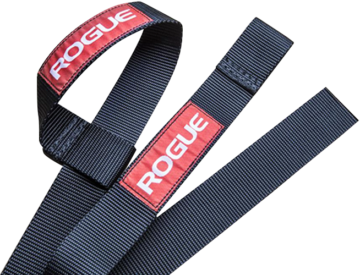
This lifting strap is designed with a cotton build and offers additional padding to limit wrist friction and discomfort. These are great for deadlifts as well as accessory movements like shrugs and rows.
Specs
- Style: Lasso
- Material: Cotton
- Length: 15 inches
- Padding: No
- Price: $16.99
- Color Options: Black
Pros
- A 20-inch length provides added grip security for extra heavy lifts, as in powerlifting.
- The lasso design allows you to instantly let go of the bar so you can drop the weight with ease.
- The reinforced stitching and edges add the durability they’ll need for repeatedly pulling heavy weight.
Cons
- There is no neoprene cushioning, so you’ll be at risk for some skin pinching or bruising around the wrist.
- If you’re doing sustained movements like farmer carries, you might want to look at a more secure strap, like a figure 8.
Powerlifting is a simple sport — you’re there to bench press, squat, and deadlift as much weight as you can. Which is why the best powerlifting lifting straps need to be extremely secure when fixed to loaded barbells, durable enough to withstand multiple heavy sessions of barbell training, and simple enough to use when your central nervous system is fried.
This strap comes in a 20-inch length, allowing a little extra room for those with larger wrists, like powerlifters, to get the most out of these lifting straps. Plus, that extra length adds more surface area to the bar, providing a more secure grip for those 10-second one-rep-max deadlift attempts. Also, the lasso design, while extremely secure, instantly lets go as soon as you open your hands, so if your deadlift goes south, you can drop the bar without it pulling you to the floor.
Thanks to the heavy-duty cotton webbing and reinforced stitching, these straps are also made to be durable for your heavy deadlift and barbell row sessions. There’s no neoprene wrist padding in these straps, so lifters with sensitive skin might feel some pinching or bruising. But many customers say they liked the stiffer feel, saying it’s, “exactly what I had been looking for with the right ‘feel,’” one five-star reviewer writes. “No ‘spring-like’ end feel when tightened around the bar.”
Most powerlifters like their gear to do one thing: help them move more weight. That’s why we love the Rogue Ohio Lifting Straps — they’re simple, effective and durable, thanks to the grippy, quick-release lasso style and heavily reinforced material.
Read our full Rogue Ohio Cotton Straps Review.
Best Lifting Straps for Deadlifting: Gymreapers Figure 8 Lifting Straps
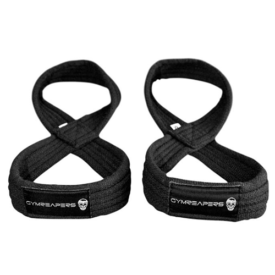
If you intend to pull some massive weights, then you need massive support, and these Figure 8 Straps from Gymreapers are designed to provide just that. With heavy-duty cross stitching and thick cotton webbing, these are meant to stand up to the heaviest and hardest of workouts.
Specs
- Style: Figure 8
- Material: Cotton
- Length: N/A
- Padding: No
- Price: $28
- Color Options: Black, Green, Khaki, Red
Pros
- The figure 8 design literally ties you to the bar. Even if you let go, these grips won’t.
- Thick cotton webbing and heavy-duty cross-stitching give these straps a weight capacity that you aren’t likely to outgrow.
- There’s no padding with these, but the 1.4-inch-thick cotton does add some cushioning.
Cons
- There is no quick release on these. When the bar goes down, you go with it, so Oly lifters should look for a different kind of strap.
- Overuse of these can lead to a lack of grip strength, which may come back to haunt you in competitions where straps aren’t allowed.
If you’re looking to really strengthen your posterior chain with heavy deadlifts, you don’t want your grip to stop you. After testing all the different lifting strap designs, we thought figure 8 lifting straps, like this pair from Gymreapers are the perfect choice. These will lock you to the bar and won’t let go until you finish your lift.
A common component in many powerlifting programs is an overloaded deadlift, one in which you perform reps of weight that your grip normally wouldn’t let you do. In these sets, you want an extremely secure strap, like the Gymreapers Figure 8 Lifting Straps, which pretty much tie your wrists to the bar. Here’s how it works: Each loop of the figure 8 goes around your wrist, with the bar resting in the area where the material crosses over itself, locking you to the bar until you remove the straps. These straps almost totally remove your grip from the equation, so you can focus on larger muscle groups and bang out more reps than grip strength might allow.
These have a weight capacity of over 1,000 pounds, so you likely won’t outgrow these anytime soon. This high capacity is thanks to the heavy-duty cross stitching and ¼-inch thick cotton webbing, which provide an unholy amount of support. They also come in three sizes to accommodate any type of bar you might be lifting on and most any wrist size. Many customers recommend trying two sizes if you’re unsure which is best for you. When you use a deadlift bar or axle bar, one reviewer writes, you may need to adjust for a larger size.
The figure 8 style of strap has become increasingly popular over the past few years due in part to competitors like Eddie Hall using this style of strap to break the 500-kilogram deadlift barrier. Though not for everyone, these straps are a solid choice for people who want to be absolutely certain that the bar isn’t leaving their hands once they’re strapped in.
Best Lifting Straps For Bodybuilding: Iron Bull Classic Lifting Straps
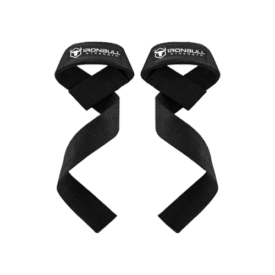
Iron Bull's Classing Lifting Straps are extra comfortable, thanks to the added wrist padding. Thanks to the reliable lasso design, you can lift without worrying about the weight slipping out of your hands.
Specs
- Style: Lasso
- Material: Cotton/Neoprene
- Length: 21 inches
- Padding: Yes
- Price: $13.95
- Color Options: Black, Black/Blue, Black/Green, Black/Grey, Black/Red, Camo/White, Green, Grey, Navy Blue, Red
Pros
- The thick neoprene cushioning is perfect for lifters who regularly perform long, bodybuilding-style workouts.
- These straps are 21 inches long, which provides more surface contact and better grip than shorter straps.
- The lasso design ensures a quick release.
Cons
- The longer strap may be too much material for movements with limited grip space, like kettlebell farmer carries.
- If you’re doing Olympic lifts where you need an instant release, these may not let go fast enough.
Bodybuilding often entails long workouts and lots of high-rep sets to help facilitate muscle growth. If you don’t want these sets to be limited by your grip endurance, a solid, comfortable pair of lifting straps, like these from Iron Bull, are essential.
Since bodybuilding workouts tend to be longer than other kinds of training, a good set of lifting straps needs to be comfortable, as well as supportive. After taking these through a few high-volume workouts, we found Iron Bull Classic lifting straps to be a great choice, thanks to the neoprene cushioning and reliable lasso-style design. We’ve used these for years, and the straps have proven to be comfortable for everything from banging out high-rep sets of dumbbell rows to sets of trap bar shrugs to failure.
The thicker padding adds a comfort that you won’t find in other lifting straps, and the 1.5-inch width provides a strong grip, helping stave off fatigue during long sets. Plus, the lasso style releases as soon as you let go, so when you’re done with your set, you can drop your weight quickly and start resting up for your next movement.
These lifting straps from Iron Bull are reasonably priced and offer solid security that should be more than enough for the average gymgoer. Plus, the padding offers an extra layer of protection and comfort on the wrist for those long bodybuilding workouts.
Best Lifting Straps for Weightlifting: Gymreapers Olympic Lifting Straps
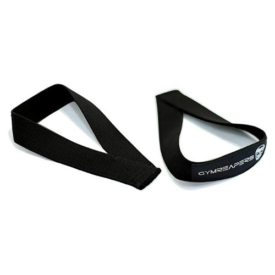
These tear-drop shaped lifting straps are great for cleans and snatches because they are reinforced with triple stitching along the seams. The soft cotton fabric allows for more comfort while lifting heavy.
Specs
- Style: Closed Loop
- Material: Cotton
- Length: N/A
- Padding: No
- Price: $14.99
- Color Options: Black, Military Green, Navy, and Red
Pros
- The 8.5-inch strap length leaves less material between your hands and the bar, so you won’t need to alter your grip while weightlifting.
- Closed-loop straps provide an instant release, so you can bail on a lift without the bar pulling you to the floor.
- These come in a few color options.
Cons
- People who want a strap for lifts other than Olympic should look at a more secure lifting strap, like a lasso-style strap.
- There’s no padding, so if you have sensitive skin, you may feel pinching or experience bruising around the wrist.
Weightlifters have a unique set of needs when looking for lifting straps. They need something that is both very secure (so they’ll stay attached to the bar during the high acceleration forces involved in snatches and cleans) but also straps that come off very quickly if they need to dump the bar. These close-loop straps from Gymreapers fit the bill.
Since cleans, jerks, and snatches require moving weight quickly and explosively, weightlifting lifting straps need to release instantaneously if something goes wrong during a lift. Gymreapers Olympic Lifting Straps are designed specifically for this purpose, thanks to the closed-loop design. This design doesn’t wrap around the bar as many times as a lasso-style strap, so the second you let go, the bar is out of your hands.
The shorter design is also ideal for weightlifters because it leaves less material between the bar and your hands, so you don’t have to adjust your technique or grip in any way. It also means you won’t achieve a super secure grip with these straps, but for lifts like clean & jerks and snatches, grip strength comes secondary to explosive strength.
The closed-loop style of Gymreapers Olympic Lifting Straps is ideal for weightlifters because it provides a measure of grip security but, more importantly, releases instantly when they need to. Plus, the shorter length means you won’t have to adjust your grip or technique when practicing high-skill movements like snatches or cleans.
Best Lifting Hook: Iron Bull Lifting Hooks
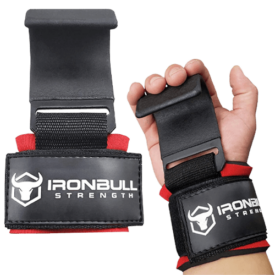
For heavy lifters, steel hooks may be the way to go. These Iron Bull hooks allow you to lift heavy without worrying about your grip strength holding you back from a new PR.
Specs
- Style: Velcro fastening
- Material: Steel/neoprene
- Length: N/A
- Padding: Yes
- Price: $29.95
- Color Options: Black, Red
Pros
- The steel hooks may be better than standard straps for more elite lifters, as they can support heavier weight.
- The velcro allows for a customizable fit and the coating prevents slipping.
- These are reinforced to offer your wrists as much support as possible.
Cons
- Unless you’re maxing your lifts, hooks probably aren’t necessary.
- You don’t get to strengthen your grip with these lifting hooks.
- While you can use lifting hooks for dumbbells, they work best with only a barbell.
What sets lifting hooks apart from straps? Well, they have a literal hook attached to help you better hold your weights when training. These are best for heavy lifting when you want to focus on your moving muscles without getting distracted by your grip.
Iron Bull’s lifting hooks are built with heavy-duty steel, which won’t bend as your PRs go up. While standard straps can offer some additional support to your standard lifts, hooks are ideal for days you’re really hitting the heavy weights. These are ideal for athletes looking to improve their 1RM. These are fully adjustable for all wrist sizes and the hooks have a non-slip rubber coating, so you won’t have to worry about the barbell dropping.
The straps are made with a thick neoprene that’s reinforced for built-in wrist support (great for heavy lifting). The straps are 2-inches wide, which is more than most other lifting straps to offer extra protection. And the hook-and-loop fastening system gives you a secure and comfortable fit, too. “These lifting hooks are really good,” one five-star reviewer writes. “I lift heavy and these make a difference when I’m doing shrugs at 500 pounds or deadlifts at 450 to 500 pounds. These are infinitely superior to straps and other hooks I’ve tried.”
Lifting hooks are ideal for heavy lifting but probably won’t work for each and every workout (dumbbell handles are probably too small for the hook and it won’t work for overhead movements). Nevertheless, if you’re looking for a pair of secure lifting hooks to up your heavy lifts, you’ve found the ideal product.
Most Secure Lifting Straps: Gymreapers Figure 8 Lifting Straps

If you intend to pull some massive weights, then you need massive support, and these Figure 8 Straps from Gymreapers are designed to provide just that. With heavy-duty cross stitching and thick cotton webbing, these are meant to stand up to the heaviest and hardest of workouts.
Specs
- Style: Figure 8
- Material: Cotton
- Length: N/A
- Padding: No
- Price: $28
- Color Options: Black, Green, Khaki, Red
Pros
- There are three sizes available, so you can adjust for bigger wrists or axle and thick bar work, giving you the safest fit.
- The figure 8 style provides maximum security during deadlift sessions.
- If you’re looking for a high weight capacity of 1,000, these straps are for you.
Cons
- These lock you to the bar — if you do any lifting where you need to drop the weights quickly, these aren’t for you.
- Grip strength is taken out of the equation with these straps. If you want a stronger grip, you’ll want to use these sparingly, if at all.
- If you do lots of different kinds of lifting, you’ll want something more versatile, like a loop-style strap.
When thinking about the most secure lifting straps, there are a lot of considerations — style, materials, stitching, and durability. Thanks in part to its lock-in design, Gymreapers Figure 8 Lifting Straps check all of these boxes, making it the most secure lifting strap we’ve seen.
These Gymreaper Figure 8 straps are designed specifically for deadlifting, rowing, and strongman-style pulling. The strap is made with heavy layered canvas cotton and contains extra padding along the wrists, along with double stitching throughout to handle heavy weight. But what really makes this the most secure lifting strap is the figure 8 design, which basically handcuffs your hands to the bar for the duration of your lift.
This design allows you to feel incredibly secure to the bar and gives no chance of slippage due to grip. You can physically let go of the bar and still remain tied to your lift, and this is what makes Gymreapers Figure 8 lifting straps our favorite choice for most secure lifting straps. Plus, the straps have a weight capacity of over 1,000 pounds, thanks to the ¼ inch thick cotton webbing and heavy-duty cross stitching, so you’ll probably break before they do.
“I’m new to powerlifting and was super hesitant to use lifting straps,” one five-star reviewer writes. “My friend suggested these for me and all I can say is WOW. They are great to use for bigger rep counts, they save my grip (I have tendinitis really bad), and they are easy to use.”
Figure 8 style straps aren’t for everyone, and we don’t recommend them for athletes new to strength training. But if you’re looking for a secure strap that’s ideal for heavy deadlift training or strongman work like farmer carries and holds, this is the strap for you.
[Related: 3 Partial Range Of Motion Lifts To Boost Your Powerlifting Game]
Benefits of Lifting Straps
The main reason for using a strap is to support your grip. A strap enables an athlete to hold more weight than their normal grip can handle, which can be ideal for working larger muscle groups like the posterior chain. For a weightlifter, a strap is often used when performing heavier clean pulls and snatches. Powerlifters will usually utilize straps when they’re working to overload their muscles and nervous system or for accessory work when their grip may be fatigued.
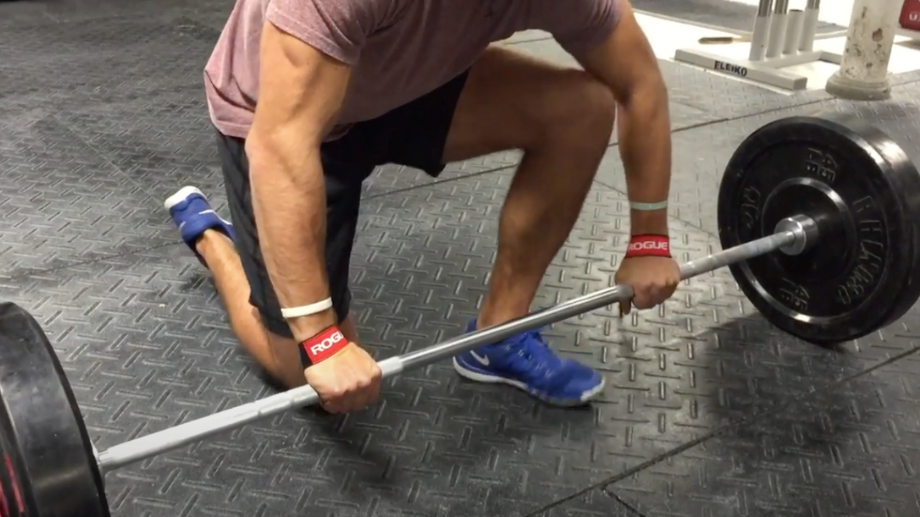
“Don’t conflate using lifting straps with cheating,” advises Alex Polish, certified personal trainer and BarBend editorial team member. “They might not be legal in powerlifting competitions, but that doesn’t mean they’re not helpful in your training sessions. Yes, you want to be specific with your training, but you also want to do what’s best for your own muscles and mind in any given session, and that often means helping yourself out with straps.”
Lifting straps can be used for a variety of reasons in strength training by multiple types of athletes. The main reason for using a strap is to support grip. A strap enables an athlete to hold more weight than their normal grip can handle. For a weightlifter, a strap is often used when performing heavier pulls and snatches. Powerlifters will usually utilize straps when they’re working to overload their muscles and nervous system or for accessory work when their grip may be fatigued.
Strongman-style training will utilize straps in a similar manner to powerlifting. The end goals are usually to strengthen and overload the body when the grip is fatigued. Whether you’re a serious athlete or a recreational lifter, straps can be a great tool to utilize in a well-thought-out program. They’re a lifting accessory that doesn’t require a ton of gym bag space and can come in handy when there’s still work to do, but your grip is shot.
How Much Do Lifting Straps Cost?
Lifting straps generally fall within a narrow price range of around $10 to $30. There are some exceptions that can cost more, such as specialty straps made for lifting axles in strongman or metal hook straps. Those are outliers and still won’t run more than $50, for the most part.
| Best Overall Lifting Straps | Gymreapers Lifting Straps | $16.99 |
| Most Durable Lifting Straps | Iron Bull Unleash Lifting Straps | $22 |
| Best Lifting Straps for the Money | Gymreapers Lifting Straps | $16.99 |
| Best Powerlifting Lifting Straps | Rogue Fitness Ohio Straps | $15 |
| Best Lifting Straps for Deadlifting | Gymreapers Figure 8 Lifting Straps | $28 |
| Best Lifting Straps for Bodybuilding | Iron Bull Classic Lifting Straps | $13.95 |
| Best Weightlifting Straps | Gymreapers Olympic Lifting Straps | $14.99 |
| Best Lifting Hook | Iron Bull Lifting Hooks | $29.95 |
| Most Secure Lifting Straps | Gymreapers Figure 8 Lifting Straps | $28 |
The straps on this list tend to fall within the normal range of prices and may even skew a bit toward the lower end of the price range. Since straps are relatively inexpensive and take up very little space, it’s a good idea to keep a pair in your gym bag so that, should you or a friend need them, you’ll have them on hand.
How to Pick the Best Lifting Straps
Whether you’re looking for your first pair of lifting straps or you’re an advanced lifter looking to boost your training, there are some considerations to keep in mind when making your investment. Here are a few of the important ones.
Primary Use
When considering which lifting straps to buy, the major factor to consider is what you’ll primarily be using them for. If you compete in weightlifting, you likely won’t have a use for figure 8 straps. Conversely, if you’re a strongman competitor, you probably don’t need weightlifting straps. Figuring out what type of lifting you prefer to do and envisioning how you’ll be using the lifting straps will help narrow down which type to get.
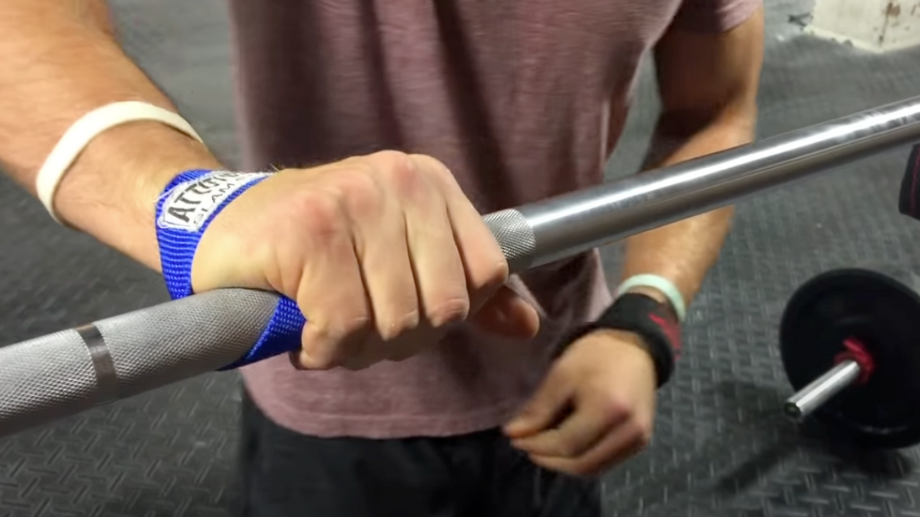
That said, if you like to do a variety of lifting styles, or if you’re still trying to figure out what you like to do, it may be a good idea to experiment and try out different styles of straps. We have a few different pairs in our gym bags ourselves — weightlifting straps (not to be confused with wrist wraps) for dumbbell work since they’re quick and easy to use, figure 8 straps for heavy deadlifts and rows, and even a pair of regular lasso-style straps for everything in between.
Frequency of Use
When thinking about buying a pair of lifting straps, how often you plan to use them can have a large impact on which ones you buy. If you’re looking for straps you can use every day for multiple sessions, you may want to consider a pair with some added wrist padding to prevent discomfort from repeated use. Maybe you only want to use the straps for max effort days. Then you’ll want to look for a pair that can handle quite a bit of weight and remain secure — like a figure 8 strap. Whatever you plan on using them for, know that durability varies with lifting straps, and keep that in mind when looking for your next purchase.
Budget
Your budget is something to consider when looking for any piece of gym equipment. It may not come into play quite as much with lifting straps as they are lower in cost than most other pieces of equipment, but it’s still a consideration. Why spend more than you have to for a pair of lifting straps when a cheaper pair will meet your needs just fine? This is where the other two points are helpful — if you know your primary use and the durability that you need, it will be much easier to figure out the right straps for you within your budget.
Main Types of Straps
As with any other type of lifting gear, there are a few different types of lifting straps to choose from. The best type of strap for you will depend largely on the type of lifting you perform and your goals in the gym.
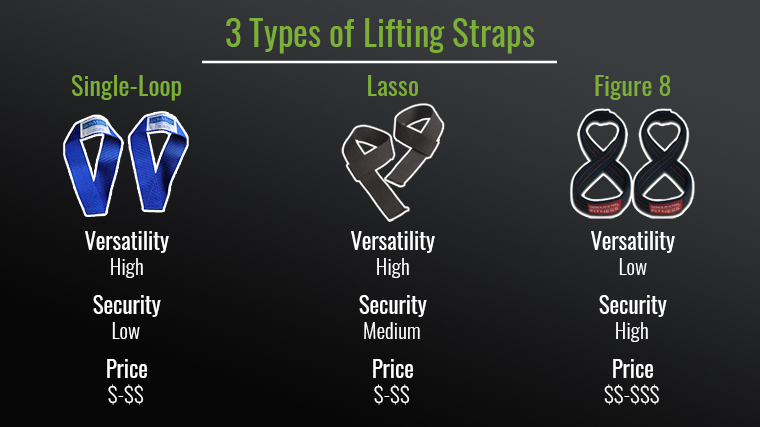
Image via BarbendThere are three common types of straps, and they include single-loop, lasso, and figure 8. Each has different attributes that will benefit a strength athlete in different scenarios.
Lasso
This strap is your classic jack-of-all-trades strap, and you’ll typically see this strap in Globo gyms and in bodybuilding-style training. This strap is highly versatile – it can be used for everything from deadlifting to lifts like pull-ups and lat pull-downs. This style strap is great for newer lifters because it’s easy to use and can be useful in most varieties of lifting. For these same reasons, it’s also a great strap for the general lifter or CrossFitter who does a bit of everything.
Single-Loop
This strap is often considered the best for Olympic lifting. This is the best strap when you need a quick release in lifting — like in the snatch and clean & jerk. Straps like the Attitude Nation Single-Loop strap were designed by Olympic lifter Jon North for Olympic lifters.
The tradeoff here is that it’s shorter than a lasso-style strap, so it doesn’t provide as much grip security. It can be used as an all-purpose strap, but if you require more grip assistance, you’re better off going with a lasso-style strap.
Figure 8
This style strap is the least versatile but most secure, thanks to the figure 8 strap design, which locks your hands to the bar, making grip strength all but irrelevant. This strap is ideal when performing maximal pulling lifts such as the deadlift and other strongman-type pulls.
This style strap doesn’t have a quick release, so it’s never recommended for power movements or occasions when dumping the bar may be required. These straps are often made with a lot of material and reinforcement, as they’re designed for holding maximal loads.
Types of Material
There are multiple types of strap material. The most common three are cotton, leather, and nylon. Each strap material will have a different feeling to it. What material people use comes down to personal preference, but reinforced cotton is the most common and has attributes that make it ideal for the majority of lifters. Nylon and leather are also used in lifting straps as well but have some downsides.
Cotton
Cotton is the most commonly used form of material in a lifting strap. This material absorbs sweat best out of the three, and the thicker the cotton, the better the sweat absorption. Most cotton straps require a few lifts to break in, and through all of our strap reviews, the average cotton strap takes about three to four good sweaty gym sessions to break in.
Softer kinds of cotton take a little less time to break in, and this strap takes about 2 to 3 lifts to feel comfortable. It’s worth noting that the softer the material — while comfortable on the wrist — the more the strap seemed to stretch with heavy lifts.
In some cotton straps, there’s added padding for comfort, like the Gymreapers Lifting Straps. The added foam pad is utilized to take the stress off the top of the wrist during heavy lifts. We found the added pad made a strap instantly more comfortable but took away from some of the sweat absorption other cotton straps offer.
[Related: The Best Foods And Supplements For Fighting Inflammation]
Nylon
Nylon is another common form of strap material. This material generally offers a smooth feeling on the wrist but can produce a little chafing when breaking in. Nylon can also be slicker, especially when it comes in contact with sweat, which is why it’s not as common as cotton in lifting straps.
This is because this material isn’t ideal for absorbing sweat; in fact, in our tests, a majority of the nylon straps moved on the wrists when getting progressively more sweaty. Someone using this style strap for a WOD or any other style of high-intensity training with lots of reps may experience difficulty with maintaining an optimal strap placement.
Leather
This material is the least common of the three and is usually used due to personal preference. The feeling of leather on the skin is much different than the above two – once it’s broken in, many feel that leather is the most comfortable material.
But when it comes to sweat, leather doesn’t absorb moisture well. In the middle of a sweaty workout, the leather lifting straps we tried actually moved on the wrist and had to be tightened multiple times. One cool thing about leather is how it maintains shape when heavy loads are placed on it — it snaps back and barely shows stress.
Final Word
Lifting straps are a great tool that can allow you to increase the amount of weight you can lift without worrying about losing your grip on the barbell or dumbbell. Used judiciously, lifting straps can be a helpful piece of equipment to empower you to maximize your lifting while still waiting for certain muscle groups to catch up to the rest.
With so many styles of straps on the market, finding the perfect fit can be intimidating. The best way to start when selecting your perfect strap is to consider your training styles, goals, and personal preferences. Once you know how you want to use them, consider factors like bar security, value, and versatility to help you dial in exactly what you want. Once you’ve made all your considerations, allow this list to guide you to find the perfect fit.
FAQs
When should I use lifting straps?
The answer to that question is going to be different for everyone. If you’re a powerlifter, then you’ll likely only use them during your off-season training since they’re not allowed in competition, or when you have a grip-heavy session such as one with rows, shrugs, deadlifts, and heavy dumbbell rows in the same workout. If you’re a strongman competitor, then you can usually use them whenever you like since straps are generally allowed in competition. For everyone else, you can use them when you feel it’s necessary — just be sure not to use them as a crutch for poor grip strength, as grip is an important aspect of overall strength.
What are the best lifting straps?
The best lifting straps for you will depend largely on the type of lifting you’re doing. Strongman competitors usually prefer figure 8 straps, weightlifters like quick-release straps, and so on. For a versatile and well-constructed pair of straps that we’re big fans of right now, we recommend the Gymreapers Lifting Straps.
How much do lifting straps cost?
Lifting straps are one of the more inexpensive pieces of lifting equipment that you’ll encounter. While the world of strength training can become quite expensive rather quickly, lifting straps generally run between $10 for a basic pair to around $30 for a really solid pair. Specialty straps can cost more, but we’ve not seen a pair of lifting straps fetch more than $50.
Lifting straps hurt my wrist — am I doing something wrong?
If using lifting straps hurts your wrists or causes a sensation that your hand is being ripped from your arm, then you may be weaning them too far down on the wrist and need to move them up over the bone that sticks out from the wrist. Wearing them too far down onto the wrist can cause the hand to be pulled from the wrist, and create a sensation of your hand being dislocated. If lifting straps hurt because of bruising or irritation of the skin, then looking into a pair with some padding on the inside may help reduce the irritation.
Should I use lifting straps or lifting hooks?
Lifting hooks were more popular in the old school days of lifting and are most often used for heavy lifting. They’ve largely fallen out of popularity since they were unreliable and prone to breaking and bending, rendering them useless after just a session or two. The design of lifting hooks also caused additional pain from pulling on the wrist and they were known for slipping and sliding when in use with heavy weights as well. Overall, lifting straps are better functionally, and generally cheaper than lifting hooks.